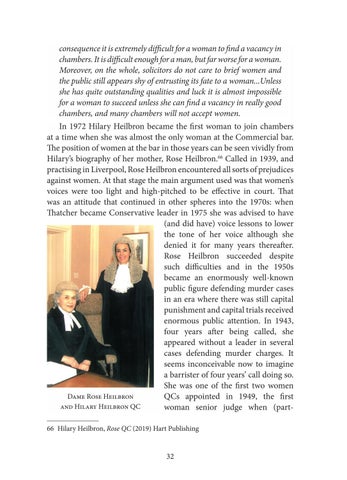consequence it is extremely difficult for a woman to find a vacancy in chambers. It is difficult enough for a man, but far worse for a woman. Moreover, on the whole, solicitors do not care to brief women and the public still appears shy of entrusting its fate to a woman...Unless she has quite outstanding qualities and luck it is almost impossible for a woman to succeed unless she can find a vacancy in really good chambers, and many chambers will not accept women. In 1972 Hilary Heilbron became the first woman to join chambers at a time when she was almost the only woman at the Commercial bar. The position of women at the bar in those years can be seen vividly from Hilary’s biography of her mother, Rose Heilbron.66 Called in 1939, and practising in Liverpool, Rose Heilbron encountered all sorts of prejudices against women. At that stage the main argument used was that women’s voices were too light and high-pitched to be effective in court. That was an attitude that continued in other spheres into the 1970s: when Thatcher became Conservative leader in 1975 she was advised to have (and did have) voice lessons to lower the tone of her voice although she denied it for many years thereafter. Rose Heilbron succeeded despite such difficulties and in the 1950s became an enormously well-known public figure defending murder cases in an era where there was still capital punishment and capital trials received enormous public attention. In 1943, four years after being called, she appeared without a leader in several cases defending murder charges. It seems inconceivable now to imagine a barrister of four years’ call doing so. She was one of the first two women Dame Rose Heilbron QCs appointed in 1949, the first and Hilary Heilbron QC woman senior judge when (part66 Hilary Heilbron, Rose QC (2019) Hart Publishing
32














